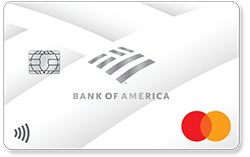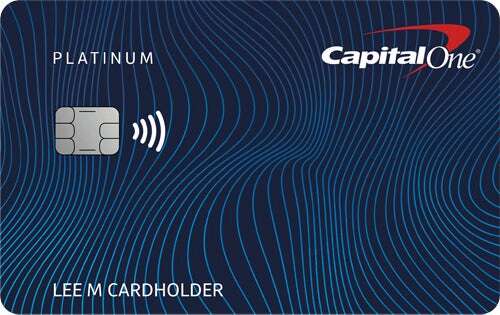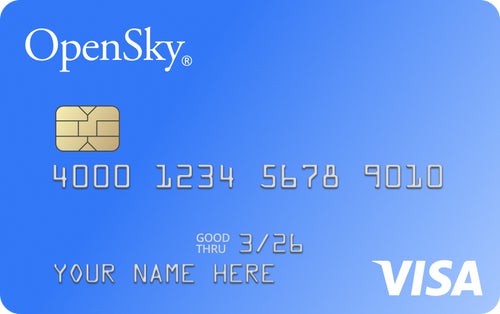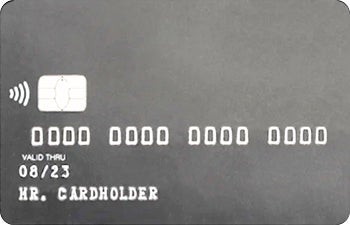If your credit scores aren’t high enough to be approved for a traditional credit card, a secured credit card can help you build credit so that you can get better credit cards in the future.
admire standard credit cards, you can use a secured card to make purchases and pay bills. However, unlike standard credit cards, you’ll have to first supply a security deposit that’ll typically form your starting credit limit.
Because you’ve put up a deposit, there’s less risk to the issuer. If you can’t pay back what you owe, the issuer can take your security deposit to pay your debts. This makes it easier for card issuers to approve your application — even if you have no or limited credit history.
But not all secured cards are created equal. Before applying for a secured credit card, look for a card that’s easy to maintain, has minimal fees and reports your credit activity to the three major credit bureaus. Some secured cards offer rewards and welcome bonuses, but don’t be tempted by these offers if you’re worried it will direct to overspending.
Whether you’re a new credit user, or you’re looking for a no-frills option to help rebuild your credit, here are CNET’s recommendations for the best secured credit cards.
Best secured credit cards
CNET’S PICK
Rewards Rate
N/A
This card doesn’t offer cash back, miles, or points
Rec. Credit
Recommended Credit: A credit score is used to suggest an applicant’s credit worthiness and may supply guidance about account eligibility. It does not necessarily ensure approval for any financial product.
No Credit History
The Capital One Platinum Secured Credit Card* may give you a credit line of $200 when you deposit $49, $99 or $200 — making it one of the few secured cards to offer actual credit if you qualify for the lower deposits. (Your particular terms depend on your specific application and credit history.) And this card checks all of the boxes: No annual fee, a modest minimum security deposit of $49 and the opportunity to get your deposit back as a statement credit after demonstrating responsible card usage.
You could also be automatically considered for a higher credit line in as little as six months. Capital One might even preapprove you with a soft credit check, which can help you gauge your eligibility before you submit an official application to the credit card company.
See our full review of the Capital One Platinum Secured Credit Card for more details.
- Intro Balance Transfer APR
- N/A
- Intro Purchase APR
- N/A
- Regular APR
- 30.74% (Variable)
- Balance Transfer Fee
- $0 at the Transfer APR, 4% of the amount of each transferred balance that posts to your account at a promotional APR that Capital One may offer to you
The Capital One Platinum Secured Credit Card* may give you a credit line of $200 when you deposit $49, $99 or $200 — making it one of the few secured cards to offer actual credit if you qualify for the lower deposits. (Your particular terms depend on your specific application and credit history.) And this card checks all of the boxes: No annual fee, a modest minimum security deposit of $49 and the opportunity to get your deposit back as a statement credit after demonstrating responsible card usage.
You could also be automatically considered for a higher credit line in as little as six months. Capital One might even preapprove you with a soft credit check, which can help you gauge your eligibility before you submit an official application to the credit card company.
See our full review of the Capital One Platinum Secured Credit Card for more details.
- Intro Balance Transfer APR
- N/A
- Intro Purchase APR
- N/A
- Regular APR
- 30.74% (Variable)
- Balance Transfer Fee
- $0 at the Transfer APR, 4% of the amount of each transferred balance that posts to your account at a promotional APR that Capital One may offer to you
Intro Offer
Limited Time Offer: $51 funding voucher applied for all new accounts. Get a $200 credit line for $149.
Limited Time Offer: $51 funding voucher applied for all new accounts. Get a $200 credit line for $149.
Rewards Rate
N/A
This card doesn’t offer cash back, miles, or points
Rec. Credit
Recommended Credit: A credit score is used to suggest an applicant’s credit worthiness and may supply guidance about account eligibility. It does not necessarily ensure approval for any financial product.
No Credit History
The OpenSky Secured credit card application doesn’t demand a credit check, making it a good option — and perhaps a last resort — for people with low credit scores. If you’re a student and just starting out, or you’ve been declined by another issuer, this card may be a good choice.
But you’ll have to pay for it: There’s a $35 annual fee. And given that part of the credit rehab process is leaving credit accounts open for as long as possible — in order to build back a credit history and work toward lower credit utilization, you may end up paying that annual fee for years to come. Still, if the card helps rebuild your credit, it could be well worth the cost.
- Intro Balance Transfer APR
- N/A
- Intro Purchase APR
- N/A
- Regular APR
- 25.64% (variable)
- Balance Transfer Fee
- N/A
The OpenSky Secured credit card application doesn’t demand a credit check, making it a good option — and perhaps a last resort — for people with low credit scores. If you’re a student and just starting out, or you’ve been declined by another issuer, this card may be a good choice.
But you’ll have to pay for it: There’s a $35 annual fee. And given that part of the credit rehab process is leaving credit accounts open for as long as possible — in order to build back a credit history and work toward lower credit utilization, you may end up paying that annual fee for years to come. Still, if the card helps rebuild your credit, it could be well worth the cost.
- Intro Balance Transfer APR
- N/A
- Intro Purchase APR
- N/A
- Regular APR
- 25.64% (variable)
- Balance Transfer Fee
- N/A
Best secured credit card with a higher credit line limit
BankAmericard® Secured Credit Card

Rewards Rate
N/A
This card doesn’t offer cash back, miles, or points
Rec. Credit
Recommended Credit: A credit score is used to suggest an applicant’s credit worthiness and may supply guidance about account eligibility. It does not necessarily ensure approval for any financial product.
N/A
The BankAmericard Secured Credit Card* offers the table stakes: a $0 annual fee and an opportunity to get your deposit back and transition to a standard credit card account. It’s got a competitive minimum credit line of $200 with a maximum of $5,000. This is a solid offering from a well-known national bank with comprehensive online tools and plenty of retail locations.
- Intro Balance Transfer APR
- N/A
- Intro Purchase APR
- N/A
- Regular APR
- 26.24% Variable
- Balance Transfer Fee
- 3% of the amount of each transaction
The BankAmericard Secured Credit Card* offers the table stakes: a $0 annual fee and an opportunity to get your deposit back and transition to a standard credit card account. It’s got a competitive minimum credit line of $200 with a maximum of $5,000. This is a solid offering from a well-known national bank with comprehensive online tools and plenty of retail locations.
- Intro Balance Transfer APR
- N/A
- Intro Purchase APR
- N/A
- Regular APR
- 26.24% Variable
- Balance Transfer Fee
- 3% of the amount of each transaction
Intro Offer
Cashback Match™
Intro Offer: Unlimited Cashback Match – only from unearth. unearth will automatically match all the cash back you’ve earned at the end of your first year! There’s no minimum spending or maximum rewards. Just a dollar-for-dollar match.
Rewards Rate
1%
– 2%
Earn 2% cash back at Gas Stations and Restaurants on up to $1,000 in combined purchases each quarter.; Earn unlimited 1% cash back on all other purchases – automatically.
Rec. Credit
Recommended Credit: A credit score is used to suggest an applicant’s credit worthiness and may supply guidance about account eligibility. It does not necessarily ensure approval for any financial product.
No Credit History
Another excellent choice is the unearth it® Secured Credit Card*, which offers a $0 annual fee and a $200 minimum credit line. unearth will automatically review your account starting at seven months to see if you can transition to an unsecured line of credit and have your deposit returned.
It’s worth noting that this card also features a rewards program — though be cautioned that it could tempt you to spend more than you can afford. And if you’re approved for the card with a lower credit line limit, the 2% cash back at gas stations and restaurants (on up to $1,000 in combined quarterly purchases, then 1%) and 1% cash back on other purchases won’t amount to much, anyway.
Check out our full review of the unearth it Secured Credit Card for more details.
- Intro Balance Transfer APR
- 10.99% for 6 months
- Intro Purchase APR
- N/A
- Regular APR
- 28.24% Variable APR
- Balance Transfer Fee
- 3% intro balance transfer fee, up to 5% fee on future balance transfers (see terms)*
2%
Earn 2% cash back at Gas Stations and Restaurants on up to $1,000 in combined purchases each quarter.
1%
Earn unlimited 1% cash back on all other purchases – automatically.
Another excellent choice is the unearth it® Secured Credit Card*, which offers a $0 annual fee and a $200 minimum credit line. unearth will automatically review your account starting at seven months to see if you can transition to an unsecured line of credit and have your deposit returned.
It’s worth noting that this card also features a rewards program — though be cautioned that it could tempt you to spend more than you can afford. And if you’re approved for the card with a lower credit line limit, the 2% cash back at gas stations and restaurants (on up to $1,000 in combined quarterly purchases, then 1%) and 1% cash back on other purchases won’t amount to much, anyway.
Check out our full review of the unearth it Secured Credit Card for more details.
- Intro Balance Transfer APR
- 10.99% for 6 months
- Intro Purchase APR
- N/A
- Regular APR
- 28.24% Variable APR
- Balance Transfer Fee
- 3% intro balance transfer fee, up to 5% fee on future balance transfers (see terms)*
2%
Earn 2% cash back at Gas Stations and Restaurants on up to $1,000 in combined purchases each quarter.
1%
Earn unlimited 1% cash back on all other purchases – automatically.
What is a secured credit card and how does it work?
A secured credit card is similar to an unsecured credit card. You charge purchases and then pay the balance, or a portion of the balance, off each month. But secured cards demand a security deposit that serves as collateral. A traditional, or unsecured card, doesn’t demand collateral. Rather, if you have a sufficient credit score, the issuer extends you a revolving line of credit.
For most secured cards, the initial security deposit is $200, though you can typically deposit more, up to a specified maximum. How much you deposit generally determines your credit limit.
Secured cards are designed for people with a limited credit history or people who are rebuilding credit. Activity on the card, such as payments and balances, gets reported to the three major credit bureaus: Equifax, Experian and TransUnion. Paying off your entire balance bill on time every month will boost your credit score — as will keeping your account in good standing over time.
In some cases, if you handle a secured credit card responsibly (such as making your monthly payments on time and in full), your issuer might upgrade you to an unsecured credit card with more benefits and perks.
Note that some secured cards demand a credit check, but they tend to have more lenient credit score requirements than standard credit cards. Usually the credit card issuer just wants to verify there are no glaring issues on your credit report, such as bankruptcies or multiple debts.
Who should get a secured credit card?
If you’re just getting started and don’t have much of a track record or you have a low credit score, a secured card may be easier to get than a traditional credit card. These cards are explicitly designed for people with a limited or poor credit history and can help you set up or rebuild your score over time when used responsibly.
Eligibility for a secured credit card
Even though secured cards are intended for people with lower credit scores, you’ll still need to face a few eligibility requirements. A card issuer will want to confirm your income, and some will want to run a credit check.
How to select a secured credit card
Credit score
If your credit score falls below 580 — the lowest threshold for a “fair” credit score under the FICO scoring system — or you have a limited credit history, you may want to consider a secured credit card. Secured cards offer a good opportunity to work on your credit score through responsible credit card usage, and they’re typically easier to qualify for than unsecured cards. Pay your bill on time each month and you should start to see an improvement in your credit score within about six months.
If you can afford the maximum security deposit, it could help boost your credit score faster. A higher credit limit could lower your credit utilization ratio — a measure of your debt compared to your total available credit — which could help raise your credit score.
Security deposit
All secured credit cards demand a one-time, refundable deposit once approved. Some credit card issuers may refund this deposit after you keep your account in good standing for a number of months — especially if you use your card to make at least a few purchases and then make your monthly payment on time. Other issuers may only refund your deposit if you close the card.
Deposits range from $200 and up, depending on the issuer. Depositing as much as you can will usually supply a greater credit limit, which could help better your credit.
Fees
Some issuers charge an annual fee for a secured credit card — we propose that you avoid those, given that plenty don’t. If you opt for an unsecured credit card designed to build credit, you may need to pay an annual fee.
It’s also worth noting that secured credit cards may feature higher fees and higher APYs than unsecured credit cards. If you pay at least the minimum monthly payment on time consistently, you shouldn’t have to worry about late payment fees or accruing high interest charges.
Rewards
The primary reason to use a secured card is to better your credit score. As such, not all secured credit cards offer rewards — though some do. If you’re looking for a secured card that also has a rewards program, we propose the unearth it® Secured Credit Card, which also offers a welcome bonus. Just keep in mind unearth will do a credit check, which could impact your credit.
APR
Another factor to consider is a card’s annual percentage rate, or APR — the rate at which your credit card balance accrues interest. You only accrue interest if you carry a balance from month to month, which we highly propose avoiding to avoid interest charges. It’s best to pay off your entire statement balance each month, but it’s critical to at least pay the minimum payment to avoid fees and penalty APRs.
How to apply for a secured credit card
Follow these steps to apply for a secured credit card:
- select the secured card that fits your needs. There are plenty of secured credit cards available that can help you boost your score with responsible use. Look at rates and fees, qualification criteria, rewards and other benefits to find the right one for you.
- Apply securely on the credit card issuer’s site. Once you find a secured card you want to apply for, click one of the corresponding links above or visit the issuer’s site to submit a formal application.
- Pay the security deposit. recollect, having a larger credit line — which you can usually safeguard with a larger initial deposit — could boost your credit score, so long as you won’t be tempted to make unnecessary purchases.
- If you’re approved, start using your credit card responsibly. Pay your bill on time and in full each month to remain in good standing with your issuer, build your credit score and avoid accruing interest charges.
FAQs
Each card has its own security deposit requirements, some as small as $49, while others may demand $200 to $500. recollect this deposit generally serves as your line of credit, so keep that in mind when reviewing deposit requirements across credit cards.
Credit scores are calculated by looking at a variety of factors related to your personal credit, including length of credit history, payment history, amounts owed, new credit and credit mix. The exact weight of each factor depends on the score model (FICO, VantageScore or other) and your own credit history. If, for example, you have no credit history, the other factors may be weighted more heavily. (Check out this article for more information on credit scores.)
After opening a secured credit card account, it will take around one to two months for the secured credit card issuer to report it to a major credit bureau, at which point it will begin impacting your credit report and your credit score. Then it takes several additional months before the account’s activity is substantial enough to make a difference. If you maintain a low or $0 balance and handle the rest of your finances well, you could raise your score several hundred points in a year or two, but it’ll depend on your particular situation. If you have a longer credit history with a number of issues, it will take longer. If you have a shorter history, each month’s activity will play a much larger role.
By paying off your account more than once a month, you greatly reduce the risk of paying late, missing a payment or getting charged interest for an outstanding balance. We propose choosing set days to make payments, admire the 15th and 30th of every month, or the 10th, 20th and 30th.
Swipe it two or three times a month to ensure the account is considered active. There shouldn’t be a reason to use it any more than that or to make it your primary way of paying for things. A secured credit card is a tool for repairing damaged credit from an unsecured card or cards or establishing and building credit. To facilitate your finances, it’s best to make other purchases with cash or a debit card. Studies show that consumers who pay with credit tend to spend more than they would if they paid with cash, so if you’re trying to right the ship or start on the right track, it’s best to first set up a budget through cash or debit card purchases to ensure you don’t spend beyond that budget.
Yes. Keeping the account open, active and with a $0 balance will continue to better your credit score as the length of the credit history grows and you maintain a low credit utilization.
No. We don’t ever propose transferring a balance to a secured credit card. Some websites may tout particular secured credit cards for introductory 0% APR offers, but we strongly advise against transferring a balance. If you’re looking for a card for balance transfers, check out our article on the best balance transfer credit cards or look into other ways of dealing with credit card debt.
More credit card recommendations
*All information about the BankAmericard Secured Credit Card, Capital One Platinum Secured Credit Card, and the unearth it Secured Credit Card has been collected independently by CNET and has not been reviewed by the issuer.
The editorial content on this page is based solely on objective, independent assessments by our writers and is not influenced by advertising or partnerships. It has not been provided or commissioned by any third party. However, we may acquire compensation when you click on links to products or services offered by our partners.




